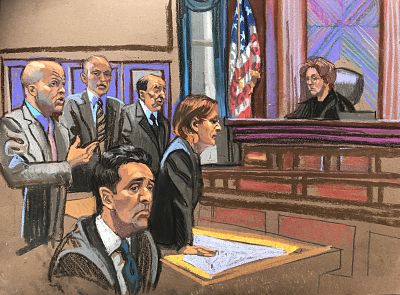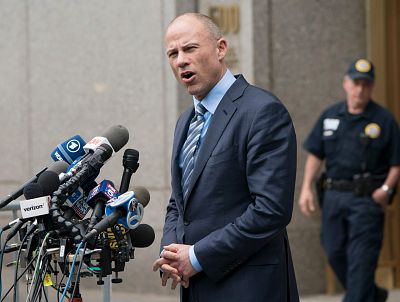Cohen's lawyers have received most of the materials seized during the FBI raid on his hotel and office, except for the contents of a shredder.
Federal prosecutors sorting through materials seized from Michael Cohen, President Donald Trump's personal attorney, said Wednesday they needed more time to piece together the contents of a shredder taken in an FBI raid.
At a court hearing in New York, prosecutors told U.S. District Judge Kimba Wood that they'd turned over most of the materials seized during the April 9 raids of Cohen's office and Park Avenue hotel room to Cohen's legal team, with the exception of two BlackBerry devices and the shredded documents.
Prosecutors explained, however, that they would need two to three more weeks to finish reconstructing what was in the shredder, and that they were still attempting to access the BlackBerry devices.
Wood set a June 15 deadline on Wednesday for Cohen's lawyers to review everything the government had already provided and make attorney-client privilege claims before submitting those claims to special master Barbara Jones. Jones was appointed by Wood to rule on what documents qualify for attorney-client privilege.
The FBI seized eight boxes of documents, four phones, one iPad and several hard drives and storage devices during the April raids, seeking information about a $130,000 payment the lawyer made to porn star Stormy Daniels shortly before the 2016 election.
According to one of Cohen's lawyers, Todd Harrison, prosecutors have already turned over 3.7 million items to Cohen's team. Cohen's team, Harrison said, had reviewed 1.3 million of those items.
Wood added Wednesday that if the June 15 deadline was not met, she would send the remainder of the unreviewed materials to a separate team of prosecutors, known as a "taint team," who would then deem what is privileged and what isn't.
Harrison told the judge that his team was "moving heaven and earth" and working nearly around the clock to review the materials that the government has turned over.
Meanwhile, Michael Avenatti, the attorney for Daniels who was present at the hearing, told reporters afterward that it was disclosed at the hearing that Cohen had been making audio recordings of Trump for years and that some of those recordings related to Daniels.
"There was a shocking admission that was made in court today. Namely, that just like the Nixon tapes years ago, we now have, what I will refer to as the Trump tapes," Avenatti said outside the courtroom.
Avenatti called on Cohen's legal team to release the tapes "so they can be heard by all, and people can make their own determinations as to their importance relating to the president and what he knew, and when he knew it, and what he did as it relates to conspiring with Michael Cohen to commit one or more potential crimes."
Avenatti had written the court earlier this month asking to be made a party to the case, saying, "We have reason to believe that plaintiff Michael Cohen, or members of his team, have begun to leak select audio recordings to the media that were seized in the FBI raids."
Cohen attorney Stephen Ryan said at the hearing that if any recordings were to exist, they would be under lock and key and that he was not aware of anyone leaking them to the press. Ryan also argued that Avenatti shouldn't be admitted to speak in the case.
"I've never seen an attorney conduct himself the way Mr. Avenatti conducted himself," Ryan told the court.
Claiming that Avenatti's frequent television appearances were part of an ulterior motive to being admitted to intervene in the case, Ryan said, "We are not going to allow this court in the Southern District of New York to be treated this way."
Wood suspended Avenatti's request, explaining that granting it would mean Avenatti, who has spoken about the case to the media often, would have to submit to local court rules which would prohibit him from making certain public statements.
Following the hearing, Avenatti withdrew his request to intervene in the case.













